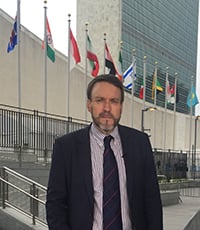Institute Professor joins US President at Leaders summit to counter ISIL and violent extremism
Research news
 US summit marks acceptance by Governments around the world that they need to work together to counter violent extremism.
US summit marks acceptance by Governments around the world that they need to work together to counter violent extremism.
As the Alfred Deakin Institute for Citizenship and Globalisation launched its new Strategic Plan, its Chair in Global Islamic Politics, Professor Greg Barton, was at the United Nations in New York for a Leaders’ Summit with US President Barack Obama aimed at countering ISIL and Violent Extremism.
Professor Barton was asked to attend the summit by the Australian Government, representing Australia’s civil society organisations (non profit, non state organisations).
The Leaders Summit represented a high-level follow-up of February’s inaugural Countering Violent Extremism (CVE) Summit at the White house.
Australia’s response to the White house summit was the Regional CVE Summit in Sydney in June. Professor Barton addressed the Sydney summit on the challenges we face in mounting counter-narrative responses to Islamic State’s powerful messaging.
Following the Sydney CVE Summit the Australian Intervention Support Hub (AISH) was launched in Canberra in August. AISH is intended to provide expert support on CVE and facilitation to community groups, families, government agencies and broader Australian society.
It is co-directed by Professor Barton at ADI and Dr Clarke Jones at the Australian National University (ANU).
In the 14 years since the 9/11 attacks Professor Barton has worked extensively on understanding violent extremism movements in the Muslim world. He has been a scholar of Islamic thought and Muslim social movements for 28 years and focuses on progressive thought and reformist civil society movements in Indonesia, wider Southeast Asia and Turkey.
As a long-term observer of Muslim society Professor Barton is deeply familiar with both Islamist extremism and progressive Islamic thought.
He remains optimistic about capacity for Muslim communities to prevail against the negative forces of extremism.
“It really was an honour to be asked to attend and represent not just Australia, but the Institute, as this sort of international engagement is key to the work we do and the impact we aspire to have,” Professor Barton said shrugging off the jetlag of the long flight back from New York.
The New York trip had been made back-to-back. Professor Barton spoke at the Malaysian Institute of Defence and Security biennial conference in Kuala Lumpur the week prior and addressed the State Islamic University conference on religious extremism and violence in Jakarta the week before that.
“The New York summit had been a long time coming, but the thing that struck me at the Australian summit was that the leading figures of the opposition sat in the front row throughout.
“It marked the beginning of the coming together of both sides of politics on the issue. “The meeting at the UN in New York was a watershed moment.”
Professor Barton said that the summit marked broad acceptance by Governments around the world that they needed to work together to counter violent extremism.
“The way you talk about the methods used to stop violent extremism and the way it is described can be counter productive,” he said.
“There is also a view that the methods being used to counter violent extremism are themselves creating a problem.”
Professor Barton said there was increasing agreement that work needed to be carried out with communities and families, as well as work aimed at stopping young Australians going to Syria and Iraq.
“It makes sense to talk about this in the way we talk about other threats to our wellbeing, for instance the way we talk about substance abuse and mental health issues.
“If a child’s wellbeing is threatened, the teacher doesn’t want to be big brother, we don’t want to be dobbing a kid in, it’s more of a conversation around what is going on in this person’s life, how we follow through and how do we help them.”
